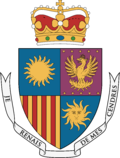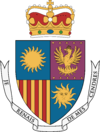Emergency Powers Act, 1739

|
This article or section is a work in progress. The information below may be incomplete, outdated, or subject to change. |
 Cortes Federales | |
| Long title | An Act to provide for the exercise of temporary emergency powers by the Government following the Spring Crisis of 1739, to establish oversight mechanisms for such powers, and for other purposes |
|---|---|
| Number | XXX |
| Introduced by | Deputy Maria Elena Sotomayor, Deputy from Alduria, (FCP) |
| Dates | |
| Royal Assent | 5.III.1739 AN |
| Other legislation | |
| Related legislation |
Military Reform Act, 1739 Government Communications Security Act, 1739 |
Key provisions
Legislative history
| Status | Date | Tabled By | Vote Outcome |
|---|---|---|---|
| Introduced in the Federal Assembly | 5.III.1739 AN | Deputy Maria Elena Sotomayor | |
| Passed in the Federal Assembly | 5.III.1739 AN | 612-0 | |
| Passed in the Chamber of Peers | 5.III.1739 AN | Unanimous | |
| Royal Assent | 5.III.1739 AN |
Text
EMERGENCY POWERS ACT, 1739
Ordered, by the Cortes Federales of Nouvelle Alexandrie,
_______________________________
to be Printed, 1739 AN.
BE IT ENACTED by the King's Most Excellent Majesty, by and with the advice and consent of the Cortes Federales, in this present Parliament assembled, and by the authority of the same, as follows:-
PART I
PRELIMINARY PROVISIONS1. CITATION AND COMMENCEMENT.
- This Act shall be cited as the "Emergency Powers Act, 1739".
- This Act shall come into force immediately upon receiving Royal Assent.
- This Act shall expire two years from the date of Royal Assent unless renewed by an Act of the Cortes Federales.
2. INTERPRETATION.
- In this Act:
- "Council of State" means the Council of State of Nouvelle Alexandrie;
- "Emergency period" means the period during which this Act is in force;
- "Emergency powers" means the powers granted under this Act;
- "Federal Forces" means the Federal Forces of Nouvelle Alexandrie;
- "Federal Guards Service" includes all branches and units thereof;
- "Oversight Committee" means the Emergency Powers Oversight Committee established under Part III of this Act;
- "Prescribed" means prescribed by regulations made under this Act;
- "Relevant authorities" means any authority or person exercising powers under this Act;
- "Security clearance" means clearance granted under the relevant security regulations.
3. PURPOSE OF THE ACT.
- The purpose of this Act is to:
- Provide temporary emergency powers to restore and maintain constitutional order;
- Establish clear oversight mechanisms for the use of emergency powers;
- Enable rapid response to threats against democratic institutions;
- Protect civil liberties while ensuring national security;
- Facilitate military reform and reorganization.
PART II
EMERGENCY POWERS4. TEMPORARY REORGANIZATION OF MILITARY COMMAND.
- The Council of State may, by order:
- Suspend, reassign, or dismiss any military officer of the rank of Colonel or above;
- Reorganize military units and command structures;
- Establish temporary command arrangements;
- Implement security vetting procedures for military personnel.
- Any order under this section must be:
- Approved by the King as Commander-in-Chief;
- Notified to the Oversight Committee within 24 hours;
- Published in the Federal Gazette within 48 hours.
5. SECURITY MEASURES.
- The Council of State may order:
- Enhanced security at military installations;
- Temporary restriction of access to sensitive areas;
- Special vetting procedures for military and civilian personnel;
- Implementation of counter-intelligence measures;
- Establishment of secure communications protocols.
- The Federal Guards Service shall have primary responsibility for implementing security measures under this section.
6. DETENTION AND INVESTIGATION POWERS.
- The relevant authorities may:
- Detain persons reasonably suspected of involvement in the Spring Crisis;
- Conduct investigations into military and civilian activities related to the crisis;
- Access relevant documents and communications;
- Question witnesses and suspects under prescribed conditions.
- All actions under this section must:
- Comply with constitutional rights and due process;
- Be reported to the Oversight Committee;
- Be subject to judicial review.
7. INFORMATION AND COMMUNICATIONS CONTROL.
- The Council of State may:
- Establish secure communication networks;
- Monitor military communications;
- Implement information security protocols;
- Control access to sensitive information.
- These powers shall be exercised in accordance with:
- Constitutional rights to privacy;
- Freedom of the press;
- Judicial oversight requirements.
8. ECONOMIC AND FINANCIAL MEASURES.
- The Council of State may:
- Freeze assets related to the Spring Crisis;
- Implement emergency financial controls;
- Protect critical economic infrastructure;
- Ensure continuity of essential services.
- The Federal Bank shall assist in implementing measures under this section.
PART III
OVERSIGHT AND ACCOUNTABILITY9. EMERGENCY POWERS OVERSIGHT COMMITTEE.
- There shall be established an Emergency Powers Oversight Committee consisting of:
- Three members appointed by the Federal Assembly;
- Three members appointed by the Chamber of Peers;
- Three independent experts appointed by the King;
- The Chief Justice of the High Court or nominee;
- The Federal Ombudsman.
- The Committee shall:
- Monitor the use of emergency powers;
- Receive and investigate complaints;
- Report to the Cortes Federales monthly;
- Make recommendations for reform.
10. PARLIAMENTARY OVERSIGHT.
- The Council of State shall:
- Report to the Cortes Federales weekly;
- Provide detailed justification for all emergency measures;
- Respond to parliamentary questions within 24 hours;
- Submit to special oversight sessions as required.
11. JUDICIAL REVIEW.
- All actions under this Act shall be subject to judicial review.
- The High Court shall establish a special chamber to hear cases under this Act.
- Appeals against detention shall be heard within 48 hours.
12. TRANSPARENCY AND REPORTING.
- The Council of State shall maintain:
- Detailed records of all actions taken under this Act;
- Regular public briefings on emergency measures;
- A public register of detained persons;
- Documentation of all security operations.
PART IV
PROTECTION OF RIGHTS13. FUNDAMENTAL RIGHTS.
- Nothing in this Act shall authorize:
- Violation of constitutional rights;
- Interference with judicial independence;
- Restriction of press freedom beyond security needs;
- Discrimination based on protected characteristics.
14. REMEDIES AND COMPENSATION.
- Persons affected by actions under this Act may:
- Seek judicial review;
- Claim compensation for unlawful actions;
- Access legal representation;
- Appeal to the Oversight Committee.
PART V
MILITARY REFORM MEASURES15. REFORM IMPLEMENTATION.
- The Council of State shall:
- Establish the Military Ethics and Constitutional Education Command;
- Implement new command and control protocols;
- Reform military intelligence services;
- Strengthen civilian oversight mechanisms.
16. SECURITY VETTING.
- All military personnel shall undergo:
- Security clearance reviews;
- Loyalty assessments;
- Constitutional awareness training;
- Professional ethics education.
PART VI
MISCELLANEOUS PROVISIONS17. REGULATIONS.
- The Council of State may make regulations:
- Implementing provisions of this Act;
- Establishing procedures and protocols;
- Defining technical requirements;
- Addressing unforeseen circumstances.
18. SUNSET CLAUSE.
- This Act shall expire two years from the date of Royal Assent.
- The Cortes Federales may extend this Act by resolution for specified periods.
- Any extension must be approved by both chambers.
19. SAVING AND TRANSITIONAL.
- Actions taken between the Spring Crisis and this Act's commencement are validated if they would have been lawful under this Act.
- Ongoing investigations and proceedings shall continue under this Act.
SCHEDULE 1
OVERSIGHT COMMITTEE PROCEDURES1. Meetings
- The Committee shall meet at least weekly.
- Special meetings may be called by any three members.
- The Committee may establish sub-committees.
2. Reports
- Weekly reports to the Cortes Federales
- Monthly public reports
- Special reports as required
3. Powers
- Access to all relevant documents
- Authority to question officials
- Power to issue recommendations
- Right to publish findings
SCHEDULE 2
PROTECTED RIGHTS1. Absolute Rights
- Right to life
- Freedom from torture
- Access to courts
- Legal representation
2. Qualified Rights
- Freedom of movement (subject to security requirements)
- Freedom of association (subject to security requirements)
- Privacy (subject to security requirements)
- Property rights (subject to emergency measures)
SCHEDULE 3
SECURITY MEASURES'1. Military Installations
- Enhanced perimeter security
- Access control protocols
- Communications security
- Emergency response procedures
2. Government Buildings
- Security zones
- Access restrictions
- Emergency protocols
- Evacuation procedures
